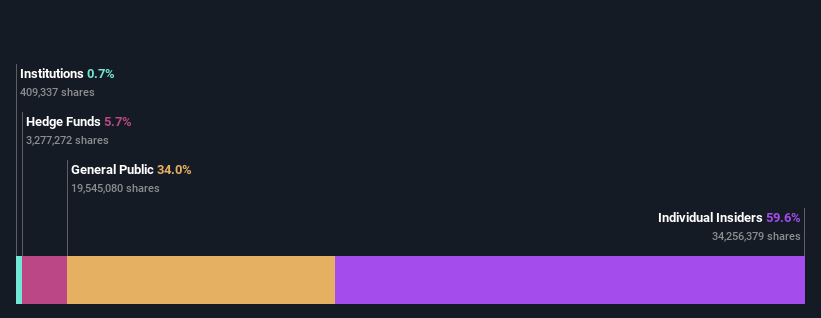Insiders are the top stockholders in Alvarium Tiedemann Holdings, Inc. (NASDAQ:ALTI), and the recent 26% drop might have disappointed them
Key Insights
Alvarium Tiedemann Holdings' significant insider ownership suggests inherent interests in company's expansion
A total of 3 investors have a majority stake in the company with 58% ownership
Using data from company's past performance alongside ownership research, one can better assess the future performance of a company
Every investor in Alvarium Tiedemann Holdings, Inc. (NASDAQ:ALTI) should be aware of the most powerful shareholder groups. The group holding the most number of shares in the company, around 59% to be precise, is individual insiders. Put another way, the group faces the maximum upside potential (or downside risk).
As a result, insiders as a group endured the highest losses after market cap fell by US$173m.
Let's take a closer look to see what the different types of shareholders can tell us about Alvarium Tiedemann Holdings.
See our latest analysis for Alvarium Tiedemann Holdings
What Does The Lack Of Institutional Ownership Tell Us About Alvarium Tiedemann Holdings?
Institutional investors often avoid companies that are too small, too illiquid or too risky for their tastes. But it's unusual to see larger companies without any institutional investors.
There are many reasons why a company might not have any institutions on the share registry. It may be hard for institutions to buy large amounts of shares, if liquidity (the amount of shares traded each day) is low. If the company has not needed to raise capital, institutions might lack the opportunity to build a position. On the other hand, it's always possible that professional investors are avoiding a company because they don't think it's the best place for their money. Institutional investors may not find the historic growth of the business impressive, or there might be other factors at play. You can see the past revenue performance of Alvarium Tiedemann Holdings, for yourself, below.
It looks like hedge funds own 5.7% of Alvarium Tiedemann Holdings shares. That worth noting, since hedge funds are often quite active investors, who may try to influence management. Many want to see value creation (and a higher share price) in the short term or medium term. Sheikh Al-Thani is currently the largest shareholder, with 30% of shares outstanding. For context, the second largest shareholder holds about 18% of the shares outstanding, followed by an ownership of 11% by the third-largest shareholder. Peter Yu, who is the third-largest shareholder, also happens to hold the title of Member of the Board of Directors.
After doing some more digging, we found that the top 3 shareholders collectively control more than half of the company's shares, implying that they have considerable power to influence the company's decisions.
While studying institutional ownership for a company can add value to your research, it is also a good practice to research analyst recommendations to get a deeper understand of a stock's expected performance. As far as we can tell there isn't analyst coverage of the company, so it is probably flying under the radar.
Insider Ownership Of Alvarium Tiedemann Holdings
While the precise definition of an insider can be subjective, almost everyone considers board members to be insiders. The company management answer to the board and the latter should represent the interests of shareholders. Notably, sometimes top-level managers are on the board themselves.
I generally consider insider ownership to be a good thing. However, on some occasions it makes it more difficult for other shareholders to hold the board accountable for decisions.
It seems that insiders own more than half the Alvarium Tiedemann Holdings, Inc. stock. This gives them a lot of power. That means insiders have a very meaningful US$594m stake in this US$1.0b business. It is good to see this level of investment. You can check here to see if those insiders have been selling any of their shares.
General Public Ownership
The general public-- including retail investors -- own 34% stake in the company, and hence can't easily be ignored. This size of ownership, while considerable, may not be enough to change company policy if the decision is not in sync with other large shareholders.
Next Steps:
I find it very interesting to look at who exactly owns a company. But to truly gain insight, we need to consider other information, too. For example, we've discovered 7 warning signs for Alvarium Tiedemann Holdings (5 are a bit unpleasant!) that you should be aware of before investing here.
Of course, you might find a fantastic investment by looking elsewhere. So take a peek at this free list of interesting companies.
NB: Figures in this article are calculated using data from the last twelve months, which refer to the 12-month period ending on the last date of the month the financial statement is dated. This may not be consistent with full year annual report figures.
Have feedback on this article? Concerned about the content? Get in touch with us directly. Alternatively, email editorial-team (at) simplywallst.com.
This article by Simply Wall St is general in nature. We provide commentary based on historical data and analyst forecasts only using an unbiased methodology and our articles are not intended to be financial advice. It does not constitute a recommendation to buy or sell any stock, and does not take account of your objectives, or your financial situation. We aim to bring you long-term focused analysis driven by fundamental data. Note that our analysis may not factor in the latest price-sensitive company announcements or qualitative material. Simply Wall St has no position in any stocks mentioned.
Join A Paid User Research Session
You’ll receive a US$30 Amazon Gift card for 1 hour of your time while helping us build better investing tools for the individual investors like yourself. Sign up here


